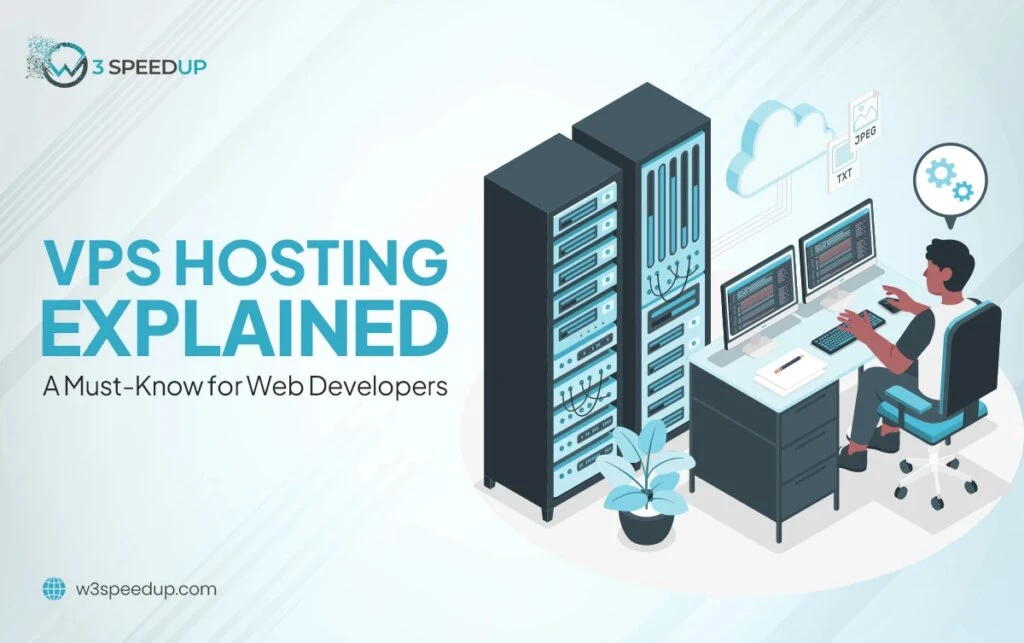Virtual Private Server (VPS) hosting is a powerful, versatile solution that offers web developers a balance of performance, control, and scalability. Whether you’re a freelance developer, part of a team, or managing your own projects, understanding VPS hosting is essential for building, deploying, and maintaining applications effectively. Here’s a deep dive into what VPS hosting is, why it matters, and how to make the most of it as a web developer.
VPS Hosting for Web Developers: Essential Information You Need
What Is VPS Hosting?
VPS hosting involves using virtualization technology to partition a single physical server into multiple isolated environments, known as virtual private servers. Each VPS operates independently, with its own dedicated resources, operating system, and software, while sharing the underlying hardware with other VPS instances.
This setup offers the affordability of shared hosting with many of the benefits of a dedicated server, such as improved performance and greater control. For developers, this means a reliable and customizable environment to host websites, applications, and other projects.
Key Features of VPS Hosting
- Dedicated Resources: Each VPS comes with allocated resources such as CPU, RAM, and storage. These resources are not shared with other users, ensuring consistent performance.
- Root Access: Developers can access and control their VPS at the root level, allowing full customization of the server environment to suit specific needs.
- Customizability: VPS hosting allows the installation of custom operating systems, frameworks, and software, providing flexibility for unique project requirements.
- Scalability: Resources can be adjusted quickly, making it easy to scale up or down based on traffic or workload demands.
- Isolation: Each VPS operates independently, so issues affecting other users on the same physical server won’t impact your projects.
Why VPS Hosting Is Ideal for Web Developers
➢ Flexibility and Control: Web developers often require control over the hosting environment to install custom libraries, configure specific settings, or test applications in different environments. VPS hosting provides root access, enabling developers to tailor the server to their exact specifications.
➢ Reliable Performance: Shared hosting environments can suffer from “noisy neighbor” issues, where resource-hungry users slow down performance for others. VPS hosting eliminates this problem by allocating dedicated resources, ensuring your applications run smoothly.
➢ Scalability for Growth: As a developer, you may start small but need to scale as your projects grow. VPS hosting makes it easy to add resources without migrating to a new server, providing a seamless growth path for your applications.
➢ Cost-Effective Solution: While dedicated servers offer maximum control, they can be expensive and overkill for many projects. VPS hosting strikes a balance between affordability and functionality, making it ideal for budget-conscious developers.
➢ Enhanced Security: With isolation from other VPS instances and customizable security settings, developers can create secure environments tailored to the needs of their projects. Many providers also offer additional features like regular backups, firewalls, and malware protection
VPS Hosting Use Cases for Developers
- Web Application Hosting: Host and deploy dynamic websites or applications built on frameworks like Django, Ruby on Rails, or Laravel.
- Testing Environments: Create isolated environments to test new features, updates, or technologies without affecting live projects.
- E-commerce Platforms: Power online stores that require secure, high-performance hosting to handle transactions and sensitive customer data.
- Game Servers: Use VPS to host multiplayer game servers with reliable uptime and low latency.
- API Hosting: Set up and manage APIs that serve data to your applications or third-party integrations.
Choosing the Right VPS Hosting Provider
When selecting a VPS hosting provider, developers should consider several factors:
- Performance: Look for high-speed SSD storage, powerful processors, and guaranteed resource allocations.
- Scalability: Ensure the provider offers easy resource upgrades without downtime or migration.
- Uptime and Reliability: Choose a provider with a strong track record of uptime (ideally 99.9% or higher) to keep your projects accessible.
- Operating System Options: Decide between Linux (Ubuntu, CentOS, Debian) or Windows VPS hosting, depending on your expertise and project requirements.
- Support and Documentation: Reliable customer support and detailed documentation are invaluable when troubleshooting or setting up your VPS.
Popular VPS hosting providers include DigitalOcean, Linode, AWS Lightsail, Vultr, and HostGator.
Setting Up Your VPS
Once you’ve chosen a provider, follow these steps to set up your VPS:
- Select a Plan: Choose a plan based on your expected resource needs (CPU, RAM, storage, and bandwidth).
- Install the Operating System: Pick the OS that best suits your project. Linux distributions are popular among developers for their flexibility and cost-effectiveness.
- Secure Your VPS: Configure firewalls, set up SSH keys, and regularly update software to enhance security.
- Install Necessary Software: Install web servers (Apache, Nginx), databases (MySQL, PostgreSQL), or any other tools your project requires.
- Deploy Your Application: Upload your code, configure your environment, and go live.
Common Challenges and Tips
☛ Managing Resources: Monitor resource usage to ensure optimal performance. Tools like htop and CloudWatch can help.
☛ Security Best Practices: Use strong passwords, enable two-factor authentication, and regularly back up your data.
☛ Learning Curve: If you’re new to server management, consider starting with managed VPS hosting, where the provider handles server maintenance.
Conclusion
For web developers, VPS hosting is a powerful tool that offers the control, flexibility, and performance needed to build and deploy robust applications. By understanding how VPS hosting works and choosing the right provider, developers can unlock new possibilities for their projects. Whether you’re hosting an e-commerce platform, testing a new app, or managing client websites, VPS hosting is an invaluable resource that grows with your ambitions.
 Christmas Mega Sale – Enjoy Up to 50% OFF on Every Plan!
Christmas Mega Sale – Enjoy Up to 50% OFF on Every Plan! 



